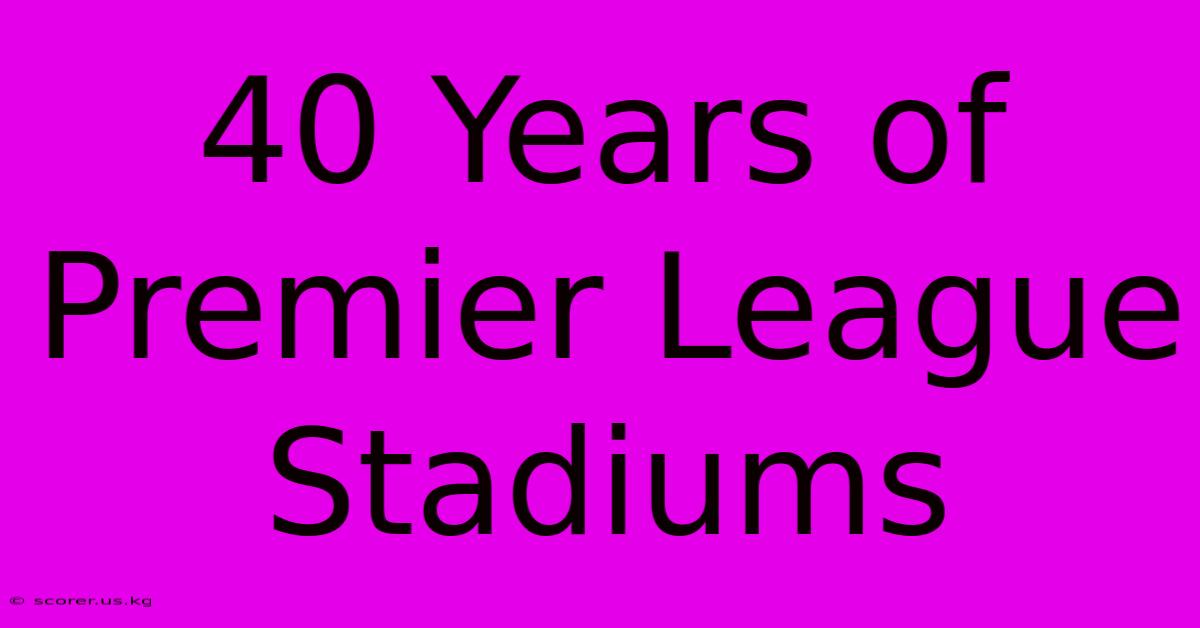40 Years Of Premier League Stadiums

Discover more detailed and exciting information on our website. Click the link below to start your adventure: Visit Best Website scorer.us.kg. Don't miss out!
Table of Contents
40 Years of Premier League Stadiums: A Nostalgic Look Back
The Premier League, since its inception in 1992, has witnessed an incredible transformation, not just in the quality of football but also in the stadiums themselves. From humble grounds to architectural marvels, the evolution of Premier League stadiums reflects the league's growth and its increasingly global appeal. Let's take a nostalgic journey through four decades of iconic venues.
The Early Days: Character and Charm
The first few years of the Premier League showcased a blend of traditional grounds steeped in history and more modern facilities. Many stadiums retained their unique character, often with standing terraces and a closer connection between fans and the pitch. Think of the atmospheric cauldron of Anfield, the passionate roar of Old Trafford, or the unique charm of Highbury (before its demolition). These grounds, while perhaps lacking some of the modern amenities, possessed an undeniable atmosphere that many fans still fondly remember.
Notable Early Stadiums:
- Highbury (Arsenal): A classic example of a traditional ground, Highbury held a special place in the hearts of Arsenal fans for decades before the move to Emirates Stadium.
- Old Trafford (Manchester United): While undergoing various expansions over the years, Old Trafford has always retained its iconic status as the "Theatre of Dreams."
- Anfield (Liverpool): The Kop at Anfield is legendary, representing the fervent support of Liverpool's passionate fanbase.
The Modern Era: Capacity, Comfort, and Corporate Appeal
The late 90s and early 2000s ushered in a new era of stadium development. Driven by increased attendances, television revenues, and the demand for improved fan experience, clubs embarked on ambitious redevelopment projects. All-seater stadiums became the norm, improving safety and comfort. Corporate hospitality suites became increasingly prevalent, reflecting the growing commercialization of the game.
Key Developments of the Modern Era:
- All-seater stadiums: A significant shift towards improved safety and spectator comfort.
- Increased capacity: Many stadiums underwent significant expansions to accommodate larger crowds.
- Improved facilities: Modern amenities such as improved seating, better concourses, and enhanced hospitality areas became standard.
The Architectural Marvels: Design and Innovation
The most recent decades have witnessed the construction of truly stunning stadiums, pushing the boundaries of architectural design and fan experience. These modern venues are not simply places to watch football; they are multi-functional spaces designed to host a variety of events, reflecting the broader commercial aspirations of Premier League clubs.
Examples of Architectural Masterpieces:
- Emirates Stadium (Arsenal): A modern, sleek design, showcasing a high level of architectural sophistication.
- Etihad Stadium (Manchester City): A state-of-the-art facility, combining cutting-edge technology with a visually impressive exterior.
- Tottenham Hotspur Stadium: A truly iconic stadium that also boasts a retractable pitch for NFL games and other events.
The Future of Premier League Stadiums
The evolution of Premier League stadiums continues. Sustainability is becoming an increasingly important factor, with clubs exploring innovative ways to reduce their environmental impact. Technological advancements are also playing a significant role, with enhanced connectivity, interactive screens, and improved accessibility features improving the fan experience. The future of Premier League stadiums promises to be exciting, blending cutting-edge technology with a continued focus on creating a vibrant and unforgettable atmosphere for fans.
In conclusion, the 40-year journey of Premier League stadiums is a testament to the league's growth and its commitment to providing a world-class experience for fans. From the charm of traditional grounds to the architectural marvels of today, the stadiums themselves have become an integral part of the Premier League's story, reflecting its past, present, and exciting future.

Thank you for visiting our website wich cover about 40 Years Of Premier League Stadiums. We hope the information provided has been useful to you. Feel free to contact us if you have any questions or need further assistance. See you next time and dont miss to bookmark.
Featured Posts
-
Butler Trade Rumors Riley Speaks
Dec 27, 2024
-
Teddy Bridgewater Next Nfl Team
Dec 27, 2024
-
No Butler Trade Rileys Statement
Dec 27, 2024
-
Teddy Bridgewaters High School Team Wins State
Dec 27, 2024
-
Leaders Pay Respects To Indian
Dec 27, 2024
